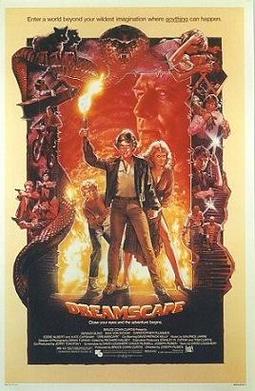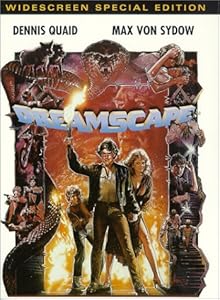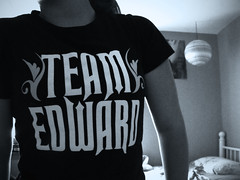"
Team Edward or
Team Jacob?"
The smiling goth in the ticket booth at the drive-in means no harm. Her words are not spoken out of spite or malice, and there is no malicious intent behind her question. She is simply trying to share in the excitement of the theatrical release of the third film in the
Twilight series, based on the novels by
Stephanie Meyer. As far as she knows, the only reason someone would be paying to see Eclipse opening weekend is that they share in the joyful anticipation of yet another chapter of Bella and Edward's ongoing saga. She doesn't know the pain that her words inflict upon me, the shame and humility that comes with subjecting a grown man to this question. I should not be in a position that might force me to choose between Team Jacob or Team Edward. No man in his thirties should have to make such a choice.
But the girl means well, so I am not impolite. I smile and tell her that I am here simply to see the film so that I can review it for my
film-review site and podcast dedicated to bad movies, and that I probably won't like it. Therefore, I really can't choose a side in the film's romantic triangle, as I am ultimately indifferent. Not quite grasping my reasoning, the young goth cheerily hands me my ticket stub and waves me through. Her farewell comment slaps me in the back of the head like a dull, rusty hatchet.
"Enjoy the show!"
At this point, you will probably guess that I approached my viewing of Eclipse with a fairly heavy bias. In my defense, it is hard to view a film sequel without any preconceived notions, unless the sequel in question is a vast departure from the previous films. There is very little about Eclipse that is a departure from the first two films in the series, other than a new director and a few fresh faces. I know. I've watched the previous films, so I am entitled to my so-called bias. I have earned it, one painful minute at a time.
First comment: The film opens with a Robert Frost poem. If there is anything more annoying than a romantic teen drama that opens with the lovestruck female lead reading a poem, it would be a romantic teen drama that opens with the lovestruck female lead reading a Robert Frost poem. If that isn't bad enough, the poem she reads is Fire and Ice. I don't care how much Bela's choice between the undead Edward and fiery-tempered Jacob is, nor do I care that the intended audience is middle-school students. This is still a exceedingly lame choice.The third film of the Twilight series finds the main characters in pretty much the exact position that they were in during the last one; Bela and Edward are still madly in love, Jacob is still a contender for Bela's love, and the redheaded vampire from the first film is still trying to kill Bela, Edward and his family of sweater-clad good-guy vampires. That about wraps everything up.
There is indeed a plot flowing through this familiar territory, but it is a rather thin stream of storyline, and the water isn't all that fresh. It seems that a local boy who ran away a year ago (in case you forget this, the film will kindly remind you every fifteen minutes or so until it becomes even more irrelevant) is now wandering the streets of Seattle raising an army of freshly turned vampires creatively dubbed Newborns for some nefarious purpose that just might involve Bela's angst-ridden heartthrobs and a few previously established not-so-nice sweater-less vampires.
Second Comment: Do we need to show the Space Needle in every Seattle shot? I can understand the establishing shots, but even well after the location of the young army-raising Forks-raised vampire has been repeated numerous times throughout the film, we are still subjected to the Space Needle looming ominously in the background. Apparently, when you live in Seattle, there is no escaping the omnipresent Space Needle.Don't get all worked up at the thought of a vampire army. The word "army" is thrown around quite a bit, but the actual horde that ends up taking on the Cullen clan only number around twenty or so. The film actually takes the time to explain that a "Newborn" army is actually much more powerful than a human or older vampire army, so the audience shouldn't feel disappointed when the much-hyped battle against the Newborn army only finds the good-guy vampires and their werewolf back-up team outnumbered by a staggering two-to-one. Don't let the concept of an "uneasy truce" between the werewolves and vampires fool you either; for such a centuries-old animosity between two races of deadly creatures, they eventually band together with less trash-talking and glaring than is typical between rival lacrosse teams during a preliminary warm-up match.
Third Comment: Foreshadowing is a "literary technique used by many different authors to provide clues for the reader to be able to predict what might occur later on in the story." (Wikipedia. Sue me.) Showing narrated flashbacks and lengthy moments of awkward exposition that blatantly inform the audience what is going to happen an hour from now is not foreshadowing. It is annoying. This is the first film in the series to be directed by David Slade, who also directed
30 Days of Night. He also declared that he would never direct a Twilight sequel when confronted with the concept during an interview. Later, shortly after accepting a huge wad of cash to direct a sequel in the Twilight series, he claimed that he was only joking when he had said that. Another funny joke was played on anyone who thought that Slade would bring some of the action in the ultra-violent 30 Days of Night to Eclipse. The two scenes that might by jokingly referred to as action sequences are both shorter than Edward and Jacobs exceedingly boring and pointless heart-to-heart on the mountain peak the night before the big finale. The first was a brief high-speed chase through the woods that resembled the speeder-bike chase in
Return of the Jedi more than anything else. Remember the aforementioned two-to-one battle with the football team-sized "Newborn Army?" There's the other. You might want to count the "training sequence" as an action scene. I don't.
Final Comment: When a girl pressures her boyfriend to have sex, and he responds by warning that it could be dangerous, implicating not that she could get pregnant, but that he might lose control and kill her in the middle of it, it is really hard to have any respect for the girl that says "That's okay, let's try anyway." If this sounds to you like the lead-in to either an extremely hot sex scene or an extremely bloody murder scene, you will be sorely disappointed twice over. Instead, you will find yourself subjected to a minute or two of very intense hugging and clothing-smoothing that continues until the shirts of both involved become partially unbuttoned, at which point they promptly decide that they have gone too far. And thus is played the greatest joke of all upon the poor men and boys dragged to see this film with their respective partners, and whose moment of hopefulness is quickly and brutally squashed beneath the heel of Stephanie Meyer's cinematic stilettos. Complaining about all of this is a moot point, however, as no one that wants to see Eclipse cares about any of this. All they care about is which potentially abusive boyfriend Bella (a name choice that is a slap in the face of any
Bela Lugosi fan) chooses; the undead vampire that repeatedly tells her how much he would like to drink her blood as she dies, or the wild half-animal who has openly warned her of his potential for injuring her if he ever loses control around her. The fact that her indecision and dedication regarding this choice hardly changes from the last film shouldn't sour the fan base, either. It is so deliciously angst-ridden and illogically romantic that you could just die.
I don't want to be mean. I don't want to hate this movie. I don't want to tell the cheerful teenage Goth in the ticket booth on my way out of the theater that the movie she will probably see numerous times with her friends for free was the steaming pile of refuse that I thought it would be, and so much more beyond. But I'd be lying if I said anything otherwise. This is not a film. This is the third act in a four-part abstinence campaign disguised as a supernatural love-story that seems perfectly fine with teaching young girls to avoid sex, but readily risk their immortal soul or hideous disfigurement at the first dreamboat they bump into before graduation.
Eclipse sucked. So there, I said. It might be an unpopular opinion, but it is an opinion I have nonetheless earned. Just ask the young teenage Goth girl in the ticket booth that I made cry.
For the full verbal onslaught of this review, check out episode #17 of MovieSucktastic on iTunes, Podcast Alley, Podcast.com orMovieSucktastic.com.
 Image via Wikipedia
Image via Wikipedia







 This little foray into my total despair at being asked by the ticket booth girl whether I belonged to Team Jacob or Team Edward can be listened to or downloaded from
This little foray into my total despair at being asked by the ticket booth girl whether I belonged to Team Jacob or Team Edward can be listened to or downloaded from 